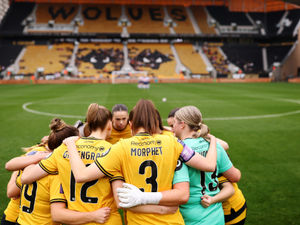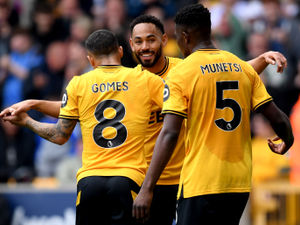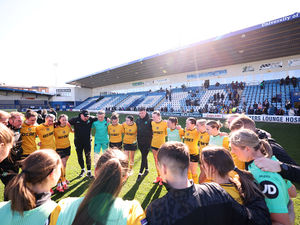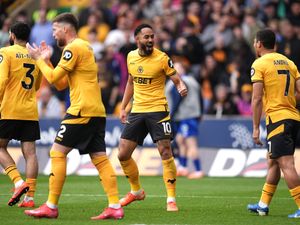Former Wolves boss Terry Connor on good and bad memories and still having more to give
A couple of bricks are tucked away in the corner of Terry Connor’s kitchen.
Concrete reminders of fond Molineux memories past.
One is inscribed ‘Terry Connor’ and the other, ‘coach’.
The bricks formed part of the wall which used to adorn the Wolves tunnel carrying the names of the play-off heroes of 2002/03 – players and staff – as Connor spent part of that season seconded from his role with the reserve team to assist Dave Jones while John Ward recuperated from a hip operation.
Truth be told Connor probably needs a few more bricks as well.
One imprinted ‘Development Coach’, another, ‘Assistant Manager’ and a third marked ‘Manager’.
Across 13-and-a-half years at Molineux, Connor – universally known as ‘TC’ – did it all.
There were plenty of ups, and plenty of downs, and life was certainly never dull.
Meeting those twin imposters of triumph and disaster, and treating both just the same, was very much a necessary pre-requisite of Connor’s lengthy spell at Wolves.
But, a decade on from a short stint as manager which didn’t go anything like he would have hoped, and a final few months back as assistant when it soon became clear it was never going to work, not one of the setbacks that Connor experienced will ever tarnish his pride and satisfaction of almost a decade-and-a-half of true diligence and professionalism.
“At the time, when you are in the moment, you probably don’t stop to reflect so much or even lift your head up as you are always thinking about the next game, the next challenge, battling away,” Connor reflects.
“It is looking back afterwards, looking back now, that you realise what a special time it was.
“That applies to both occasions we got promoted – you can see the bricks over there from the play-offs – but particularly the second time with the journey that we went on.
“The club at that time was something special, with Mick (McCarthy) as manager, the players, staff and fans and everyone around us were together and I think that is why we all remember it so fondly.
“With the resources that we had, I think we were relatively successful in getting promoted and spending three seasons in the Premier League.
“We were never going to threaten the top six of course, but we managed to stay up there for three seasons, probably against the odds.
“It was how we achieved it, with the camaraderie, the bonds that were in place, that intuition of everyone really tuned in to each other and knowing exactly what needed to be done.
“Looking back, it was only in the final season that things started to go wrong due to various reasons which was obviously very disappointing.
“Throughout my years at Wolves there were plenty of tough times but even the relegation, and what happened to me after that - even though it hurts, it will never dampen that feeling of what we achieved and the memories we shared.
“Nothing will ever take away the honour, privilege and the pride I had in working for Wolves, and I never look back with anything but fondness.”
Amid that cumulative team effort which Connor highlights as being responsible for the periods of success, his own personal part in those achievements were the culmination of many years of serving a substantial coaching apprenticeship.
After his impressive playing career as a striker was ended by injury at the age of 31, he completed his UEFA ‘C’ ‘B’ and ‘A’ coaching licences through the FA, as well as a two-year sports therapy course which would have enabled him to help work with others dealing with injuries.
Further qualifications would follow at Wolves, where he completed the UEFA Pro Licence and the League Managers Association’s Diploma in Football Management.
Rewinding back to those early days, and having always enjoyed visiting schools to work with young people as a player, Connor then landed a position as Football in the Community Officer with Swindon Town.
“It was myself and the club’s PFA Community Officer Jonathan Trigg, going out to anywhere that would take us with a bag of balls, some cones and some bibs,” Connor describes.
“Schools, junior clubs, youth clubs, girls’ football which wasn’t really happening at that time, soccer schools – we would put sessions on here, there and everywhere, and I loved it.”
Connor transferred the same formula to Bristol Rovers, before his coaching talents soon caught the eye of the manager who promoted him first to work with the Centre of Excellence, and then the reserves.
That manager in question was future Wolves assistant and caretaker boss, John Ward, who then took Connor with him when he landed his next position at Bristol City, and later recommended him to Colin Lee at Molineux.
“I have always worked diligently and given 100 per commitment to all the managers I have worked under, but there are two who I particularly appreciate in terms of how instrumental they have been for me in my coaching career,” Connor explains.
“That has been Mick over the second half of my coaching career, and it was John at the start.
“All you are looking for as an aspiring coach is an opportunity to show your talent, and John was the first person to give me that opportunity.
“I think he must have seen some potential in me as someone who could work with younger players, and make them better, but could also work with senior players as well.
“John gave me a chance, and I will be eternally grateful that he did.”
Opportunity knocked with that move to Wolves in 1999 as a Development Coach, looking after the reserve team and, in particular, helping young players aim to bridge the gap between academy and senior football.
As well as his coaching abilities Connor was also able to call on his own experiences as a player, having made his debut as a 17-year-old for Wolves’ Friday night opponents, Leeds United.
How did he mark his debut? With a winning goal against West Bromwich Albion.
“The Wolves fans should like that one,” he says with a chuckle.
Although perhaps less so when he headed home after just 55 seconds at Molineux in 1980, albeit before Emlyn Hughes and John Richards notched to secure Wolves’ comeback.
Connor’s rise to prominence at his hometown club Leeds was testament to his development and a love of football which began, like so many, at a very young age.
His father John was part of the Windrush generation who moved to England from the Caribbean, bringing with him a strong love of cricket.
Unfortunately, however, when Connor senior brought the red ball out to play, the young footballing hopeful chose to kick it, rather than catch it. Ouch!
No pain no gain though, and many years as a schoolboy at Leeds, and then four as a professional, Connor moved on to Brighton – famously scoring in a FA Cup win against all-conquering Liverpool, prior to further spells with Portsmouth, Swansea and Bristol City.
Wherever he went he scored goals, and that applied also to the one occasion he secured an England Under-21 cap as an over-age player, in a 1-1 draw against Yugoslavia at Peterborough’s London Road in 1986.
Future Wolves winger Paul Simpson provided the cross for Connor to convert a diving header as part of a team also featuring Stuart Pearce, Tony Adams, Nigel Clough and David Rocastle.
“I remember then England manager Sir Bobby Robson coming into the dressing room after the game and telling me he thought I took my goal really well and ran the channels well too,” says Connor.
“I wouldn’t call it a regret, but I did feel I warranted another opportunity to see if I could perhaps bridge the gap to international football although Brighton at the time were in the Second Division and there were some very good young strikers in the top-flight.
“There were some fabulous players in that England Under-21 team, many who went on to have brilliant careers, and I am proud to have got that chance alongside them.
“And that goes for my whole career, because although it was disappointing to finish relatively early through injury, I still feel very lucky to have had a 15-year career playing at grounds like Old Trafford, Anfield, Highbury, Maine Road and White Hart Lane.
“So many others had the same dreams and aspirations as I did but never had the chance to play at stadiums like that.
“In terms of my ability I probably did as well as I could simply because of the way I was.
“The way I wanted to play the game and the way I was committed to it probably took me past others who were more talented than me and thought of as better players.”
Little wonder that taking that attitude into the coaching arena saw Connor make the progress he did leading to joining Wolves at the turn of the Millennium.
It would take him to the Millennium Stadium as, after several years working with the reserves, he stepped up for Ward during the play-off season, a role which he maintained under Jones until Stuart Gray’s arrival midway through the first ill-fated Premier League campaign prompted a move back to Development Coach.
Having also previously lost his first team coaching job at Rovers after a change in management, Connor could have been forgiven for wondering what might be happening when called in to see McCarthy as he prepared to head into his second full season at Molineux in 2007/08.
“When I lost my job at Bristol Rovers it really affected me and I remember John giving me one of his many pieces of great advice,” says Connor.
“He told me that sure as sure I would get sacked again, not to take it personally, and that I needed to move on because if I couldn’t handle it then I wouldn’t last in football.
“During Mick’s first season when he was working with ‘Taff’ (Ian Evans) and we reached the play-offs, I’d been doing some bits with the first team.
“At the end of that season, unbeknown to me, Taff had decided that he wanted to step down and when Mick called me in, I was thinking ‘here it comes, he’s going to bring someone else in instead’!
“I went into the office, and he could see I wasn’t sure what was coming, so he just pointed to the seat at the other desk and said: ‘you come and sit here then, you come and sit with me.’
“He told me that he wanted me to be his assistant, that when he wasn’t there, he expected me to run the ship.
“That gave me a confidence and belief in my ability, strengthening the loyalty between us and forging a really strong alliance with us working together.”
And that, 15 years ago now, was the start of a flourishing working relationship which continues to stand the test of time.
They had played against each other previously, Connor recalling McCarthy telling him to ‘stand still and stop running’ and replying that he was running for a reason, to avoid being on the end of a clout from behind.
Now they were on the same side and the dynamic between a manager and assistant, and indeed then filtering down to a squad, is pivotal to a team’s fortunes.
Perhaps one of the secrets of the success of this particular partnership is that the two are always completely open and honest with each other, as well as being very different characters.
“Very different characters yes, but definitely the same values,” Connor chips in.
“Maybe it is because we are both from Yorkshire and we both grew up knowing we had to work for absolutely everything in life and not shirk any challenges, but all those messages are exactly the same in football.
“You need to work hard if you are to achieve anything and if there is a challenge in front of you then you have to take it on and not shirk it.
“We both look very different in size and stature and a bit like an odd couple when we turn up at matches but the partnership works, by passing on those same messages in different styles.
“Mick is the manager and he gives his instructions out and sets the agenda and my strength is then ferreting about amongst the players and making sure they understand the detail.
“That doesn’t mean we never have disagreements, and I think the last thing Mick has ever wanted is people around him who are ‘yes men’.
“There are times when we will have strong discussions behind closed doors but he will always listen.
“And once the decision is made, and we walk out that door, our messages are the same, to staff and to players.
“No player will ever hear anything different from me, such as ‘well I would have played you’ or anything like that.
“We have a great working relationship and when we are not at work, we enjoy each other’s company and our families get on well but I will always have that level of respect that he is the manager.
“The gaffer has managed for over 1000 games and I just hope I have continued to help him in just the same way as ‘Taff’ did so excellently for so many years previously.”
The partnership certainly worked at Wolves, particularly with the development of the ‘young and hungry’ group of players who improved both as individuals and as a team on nowhere near the highest budget ever seen in the Championship, and lifted the title in 2008/09.
Foley, Stearman, Berra, Elokobi, Ward, Henry, Jones, Edwards, Kightly, Jarvis, Keogh, Ebanks-Blake…the list is substantial.
“That was such a big part of the job for me, working alongside other members of staff to improve all those players and mould them into a team alongside the experience of people like Jody Craddock,” Connor explains.
“How do you develop Karl Henry? Dave Edwards? Kevin Foley? Andy Keogh and Wardy who had started out in Ireland. How do you get them to develop both individually and as part of a team? How do you work with George Elokobi and take him from Colchester where he was a rough diamond to becoming a Premier League player?
“It was about creating a coaching and working environment where we were all able to influence them and work with them to make the most of their talents.
“All those lads were so keen to learn and to get better and they just needed guidance and with Mick having to deal with so many other parts of the job which you do as a manager, he needed to know that those players were going to be developed and worked with to improve the team.”
The memorable moments continued after promotion, even with the doughty survival battles which were aided and abetted by signings such as Kevin Doyle, Stephen Hunt and Steven Fletcher.
Wins over Liverpool, Manchester United, Manchester City, Chelsea and Tottenham showed what the team could achieve on its day, but, as time went on, and the club tried to evolve, momentum moved in the opposite direction.
Had that group of players reached their natural end? Was it the arrival of new signings to try and push forward which ultimately didn’t have the desired response? Was there an over-reaction to a calamitous result at home to West Bromwich Albion?
Whatever the reasoning, on a Monday morning less than 24 hours after that derby defeat, the manager had been sacked, and, with preparations already in place for a replacement, so too Connor.
Or so he thought.
Midway through his farewells, with bin bag at the ready to gather up his possessions, he was told to hang fire as he would be needed to look after the team until the new man arrived.
Gradually one day became two, then the weekend came and went, and, midway through the following week, the second of the international break, there was still no sign of a new appointment.
Connor had elicited a positive response in training from a squad who had initially been both surprised and disappointed by McCarthy’s departure, and, amid knockbacks in the recruitment process, he had emerged as a strong contender for the vacancy.
“I had resigned myself to leaving and had seen all the names mentioned and was thinking that one day I would walk in and that would be it,” he recalls.
“Then I was asked to go and see Steve (Chairman Steve Morgan) and Jez (Chief Executive Jez Moxey) in the office.
“Steve started asking me what I would do after the Albion defeat if I was in charge of the team, who I would pick and how I would set up and approach everything.
“All of a sudden, I realised what was happening, they were actually thinking of me being in charge for the Newcastle game on the Saturday, finding out what I would do.
“They must have thought I had something about me, and I imagine they would have asked the players and staff how training had been and must have had some positive feedback.
“I decided that if I did get the chance, I would go with the players who I knew would give it a go, to try and keep us up.”
Connor was indeed handed the reins, for the final 13 games of the season, and it all began positively, the players showing they were right behind him by coming from 2-0 down at half time against Newcastle to draw 2-2 in front of over 50,000 at St James’ Park.
Ultimately however, it wasn’t to be, and Wolves weren’t able to win any of that home straight of fixtures, finding themselves relegated after a home defeat to eventual champions Manchester City with three games remaining.
For Connor, it was a learning curve, and a steep one at that, but the staff rallied around, especially chief scout and long-term McCarthy confidante Dave Bowman, and, in stepping up to assistant from Development Coach, Steve Weaver.
In truth though, if a squad with McCarthy and Connor, after all their years of working successfully together, was going to struggle, then to survive after losing the more experienced man was always going to prove a tall order.
There were also plenty of issues to deal with behind the scenes, some player situations which reached the media and others that didn’t, as well as fronting up to decisions made including when having to substitute David Davis, who he had brought back from loan to replace the injured Henry, early in the game against Arsenal after Sebastian Bassong was sent off.
Chants of ‘You don’t know what you’re doing’ from the fans is pretty much a rite of passage for any manager, but Connor decided, as on all occasions whilst in the hotseat, to explain his reasoning to the media in that Davis was still adapting to the pace and intensity of the Premier League and hadn’t lasted longer than an hour previously.
When relegation was signed and sealed, despite another battling performance against City, it was an emotional Connor who faced the media and, even now, sat in his kitchen a decade on, there is still a lump in the throat.
“I remember having to go and face the cameras and being asked how it felt and I replied with ‘how do you think it feels’?” Connor recalls.
“It was really raw to me, as the man in charge, having to go out and talk to everyone about getting relegated.
“The whole dressing room was raw, and sitting here now it brings it back and I can still feel it.
“It was an emotional day, and people were coming up to me in the week which followed and saying that although we had been relegated and they didn’t like it, what I had said had described exactly how they were feeling.
“I learned so much during that spell as manager, but I didn’t change too much in terms of how I dealt with the players.
“That was a conscious decision because those players had known me for a number of years and with everything that was happening, I felt our best chance after losing the manager and not bringing in a high-profile replacement was to keep things on an even keel.
“I didn’t try and change the way we played too much, I certainly didn’t change my character or put a suit on – can you imagine how the lads would have reacted if I suddenly started doing things like that?
“It didn’t go anything like any of us wanted it to, but it was still an unbelievable experience and I will always be proud to have done it.
“It has helped me in working with Mick since because I got to see all the aspects of a job that the manager has to deal with and I can probably relate and help him a bit more having gone through that experience.”
By the time it reached his 13th and final game at the helm, Connor already knew he was not going to land the job permanently, with Stale Solbakken coming in instead.
He would love to have taken it on, he had already been thinking about potential squad movement with players moving on or coming in, but effectively, the warm ovation received by the team on the final day at Wigan is when he draws a line in the sand as to his Wolves’ history.
And that’s because while he stayed on for several months under Solbakken and was prepared to quickly shrug off his own disappointments and once more give his all for the club, the new boss was moving in a different direction and was always keen to bring in his own staff.
A decade on, Connor has spent the vast majority of that time in work, linking up with McCarthy with Ipswich, the Republic of Ireland, APOEL in Cyprus and, most recently, Cardiff City.
Heading to South Wales when Cardiff were struggling in the Championship midway through last season, the duo engineered an 11-game unbeaten run that, for a time, turned fears of relegation into a potential play-off push.
This season however, an eight-game losing streak brought an end to their tenure after just nine months, and therein lies a powerful motivation to want to get back in, as soon as possible.
“Mick has managed over 1000 games, and I’m not sure how many of those I have been with him, but we have never lost eight on the bounce before,” says Connor.
“The way we both are – there is absolutely no way we want to finish like that.
“We want to get back to work and I need to get back to work and there is plenty of life left in us yet.
“We still have the enthusiasm, the desire to improve players and build a team, and all the experiences built up over the years.
“If it’s not to be, then, speaking for myself, if there are other avenues which open up within a football club at some stage, then I would definitely be interested in going back to work.
“Ideally though, I’d love for us both to be back in tandem, working with a squad again and going out and trying to win games – that’s what we want to do.”
Connor is keeping himself busy whilst waiting for a fresh opportunity.
Only last week he was in London with other coaches to meet with and listen to England rugby coach Eddie Jones, before joining McCarthy to deliver a coaching masterclass for the LMA at St George’s Park.
Connor is, as the term goes, a football man, very much so, but also a family man, and any spell away from the game does allow for more time with wife Jan, children Hayley, Nicole and Louis and catching up with grandchildren Alfie (5), Siena (3), Jonah (3) and Esme (1).
He turns 60 later this year, but the coaching fire burns brightly, not least the desire to influence the careers of more players as he has in the past.
Back in 2018 he took the opportunity to work with talents such as Aaron Wan-Bissaka, Tammy Abraham, Phil Foden and Dominic Calvert-Lewin by linking up with England Under-21 coach Aidy Boothroyd for two fixtures as part of an FA initiative to promote more black coaches.
Joleon Lescott describes Connor as “one of the most influential coaches he ever worked with,” Murray looks on him as an “unbelievable human being” and Henry recalls the squad as “always being behind TC who had the respect of the dressing room.”
Mention these compliments to the man himself and there is not even the slightest hint of swagger or self-importance.
“If those lads took something away from the work we all did with them, and if they felt they had improved both as players and people, then of course I am happy and very proud,” he responds.
“But while it is always nice to see players go on and have stellar careers in the way Joleon did, just as important for me, if not more important, is those who made a living lower down in the pyramid.
“I think of players like Colin Larkin, Michael Townsend, Ashley Vincent, Keith Lowe, who has played hundreds of games and is still going with Kidderminster Harriers.
“They applied themselves in exactly the same way as those top players and made the most of their abilities to have careers, which is great, and when I receive a text from those guys it gives me just as much pleasure as a bearhug from Matt Murray or Carl Ikeme which crushes the life out of me!”
There are many who would hold Connor as a role model, in the same way as he was inspired by the likes of Clyde Best, Viv Anderson and Albion’s ‘Three Degrees’ Cyrille Regis, Laurie Cunningham and Brendon Batson, when he first set out as that ambitious young striker at Leeds.
There is still time for more work with players, for Connor to continue to have an influence, to develop and improve.
Still plenty more time to lay ‘Another Brick in the Wall’.





